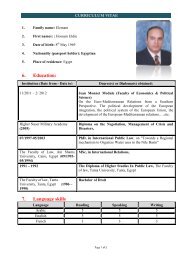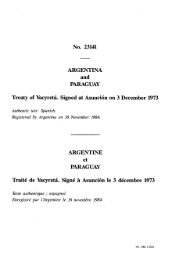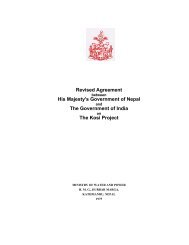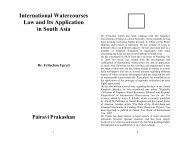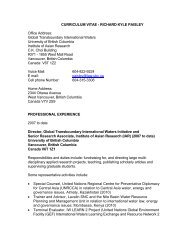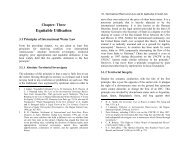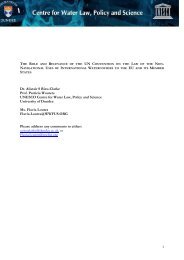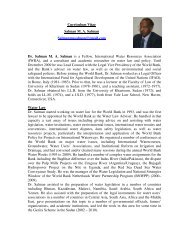Upreti, Trilochan, International Watercourses Law and Its Application ...
Upreti, Trilochan, International Watercourses Law and Its Application ...
Upreti, Trilochan, International Watercourses Law and Its Application ...
Create successful ePaper yourself
Turn your PDF publications into a flip-book with our unique Google optimized e-Paper software.
Equitable Utilisation / 107 108 / <strong>International</strong> <strong>Watercourses</strong> <strong>Law</strong> <strong>and</strong> <strong>Its</strong> <strong>Application</strong> in South AsiaLater, in negotiation with the Israeli PM, he put forth thisproposal officially in 1981. 13 It was reported that Israel refusedthe proposal. 14When Ethiopia, sharply criticised the Egyptian proposal statingthat it would be a misuse of its share of the Nile, PresidentSadat warned Ethiopia in stern words:"we do not need permission from Ethiopia or theSoviet Union to divert our Nile water. If Ethiopiatakes any action to block the Nile waters, there willbe no alternative for us but to use force." 15The responsible leaders of the Middle East speak aboutsecurity, which means water security. President Sadat had onceexpressed the view that “the only matter that could take Egyptto war is water.” 16 Above all, these claims were clearly basedon her historic rights over the Nile waters or ‘priorappropriation’. On the contrary in the parallel situation over theTigris <strong>and</strong> Euphrates, water supply is denied by Turkey to Iraq<strong>and</strong> Iraq’s historic <strong>and</strong> ancient right over these waters is notsafeguarded. 17 The situations in the Jordan, Ganges,Brahmaputra <strong>and</strong> Indus are quite different. However, most ofthe above examples are explicitly linked with the idea of prior13 A. T. Wolf, Hydro Politics Along the Jordan River: Scarce Water <strong>and</strong><strong>Its</strong> Impact on the Arab-Israeli Conflict, Tokyo: United NationsUniversity, 1995, p. 57.14 A. T. Wolf, "Hydro-Political History of the Nile, Jordan <strong>and</strong> EuphratesRiver Basins" in A. K. Biswas (ed), <strong>International</strong> Waters of the MiddleEast: From Euphrates-Tigris to Nile, Oxford: Oxford University,1994, p. 30; also see ibid.15 Ibid. p. 31.16 D. A. Caponera, "Legal Aspects of Transboundary River Basins in theMiddle East: The Al Asi (Orontes), The Jordan <strong>and</strong> the Nile" (1993) in33 NRJ, pp 631-632.17 Supra note 11, pp. 158-172; see A. Soffer, Rivers of Fire: the Conflictover Water in the Middle East, Lanham, Maryl<strong>and</strong>: Rowman &Littlefield, 1999, pp. 88-112.appropriation or existing use, one of the relevant factors to betaken into account under Article 6 of the UNCIW.In practice, this rule is most often inimical to the interest ofupstream states because ancient civilisations <strong>and</strong> utilisation ofwater took place along the banks of rivers in downstream states,for example in ancient Egypt, India, <strong>and</strong> China. Thus, theybenefit from this concept. Conversely, the weaker upstreamstates, like Nepal <strong>and</strong> Ethiopia, now have to contend withmassive prior appropriation by other downstream neighbours,which hinders them from utilising such common waters. Inthese circumstances, when a poor <strong>and</strong> vulnerable country needsco-operation (in finance, technology <strong>and</strong> skills), it finds itself inthe unenviable position of not being able to develop any waterprojects on account of the objections raised by asymmetricalneighbours. It is, therefore, an obvious injustice <strong>and</strong> against thespirit of the Charter of the UN <strong>and</strong> of Articles 5, 6, & 7 of theUNCIW. 183.1.4 Equitable UtilisationThis is the most widely recognised <strong>and</strong> practiced principle inthe resolution of water related problems. It is based on equity,fairness <strong>and</strong> norms of distributive justice in which the interestsof every contestant country are taken into consideration.Equitable utilisation is central to this book <strong>and</strong> the rest of thischapter is devoted to its study. IWL recognises equitableutilisation as a set of well-established rules, which are also18 There are numerous instances of projects being cancelled due to theobjection of riparian states on such grounds. In the Nile project westernfunding was cancelled as it was in Ganges, Kanaki, Tamur in Nepal<strong>and</strong> several other parts of the world. At the same time rich <strong>and</strong>resourceful states were able to develop any project against the spirit ofIWL For example the Farakka, Chicago diversion, Three Gorges <strong>and</strong>the Nile’s case explicitly ignore the right of the nine upper riparianstates for which international law <strong>and</strong> the international communityhave remained mere spectators.



